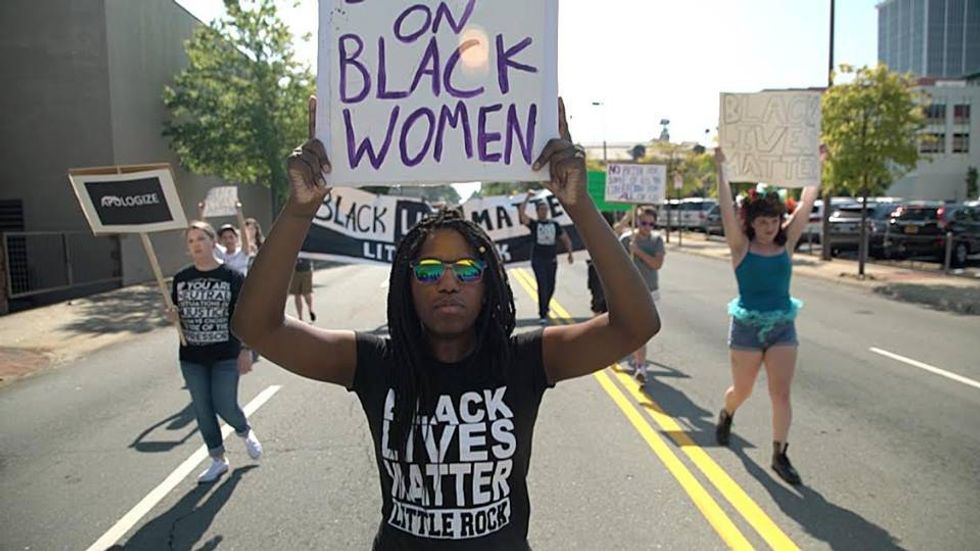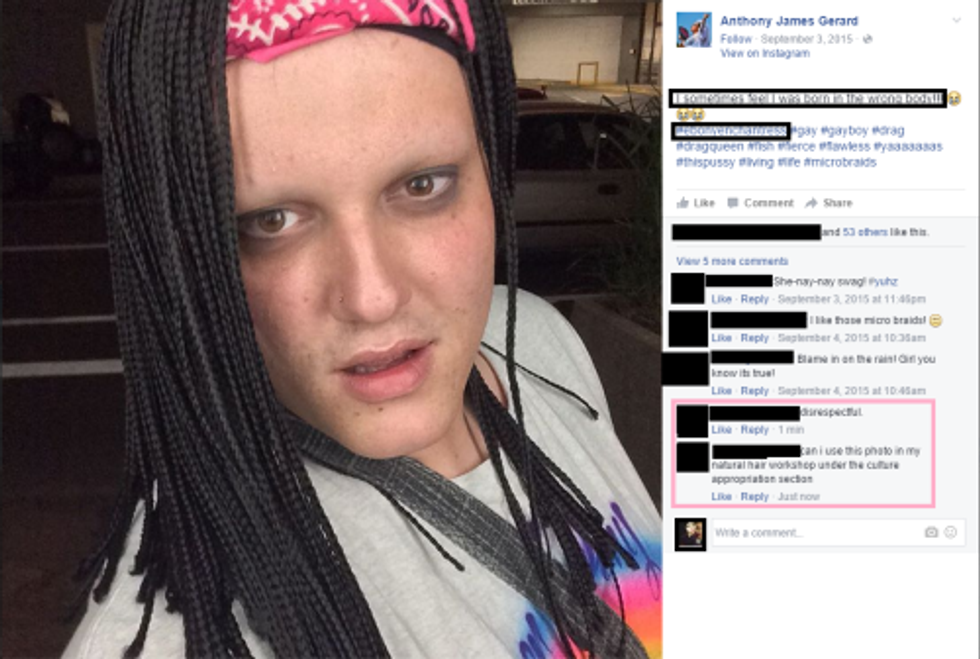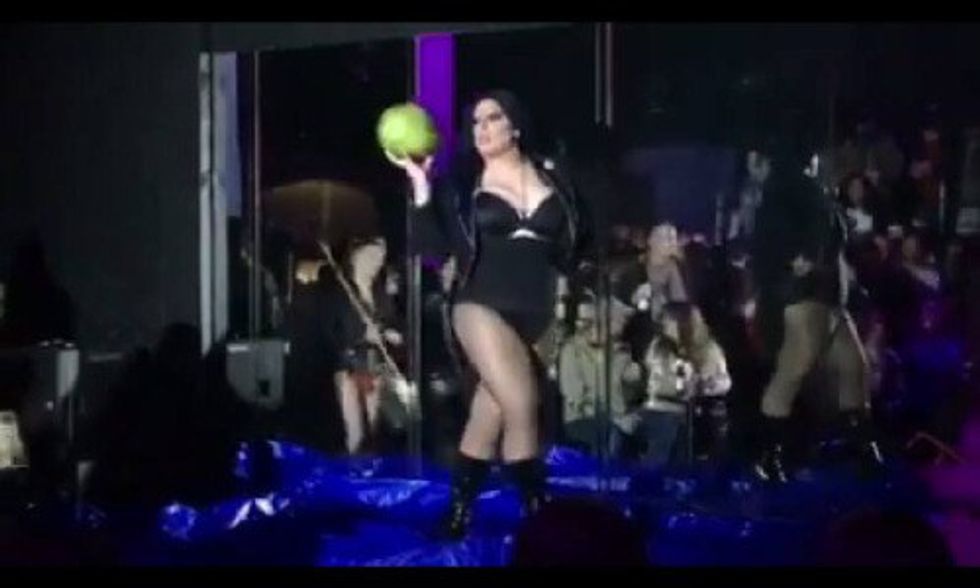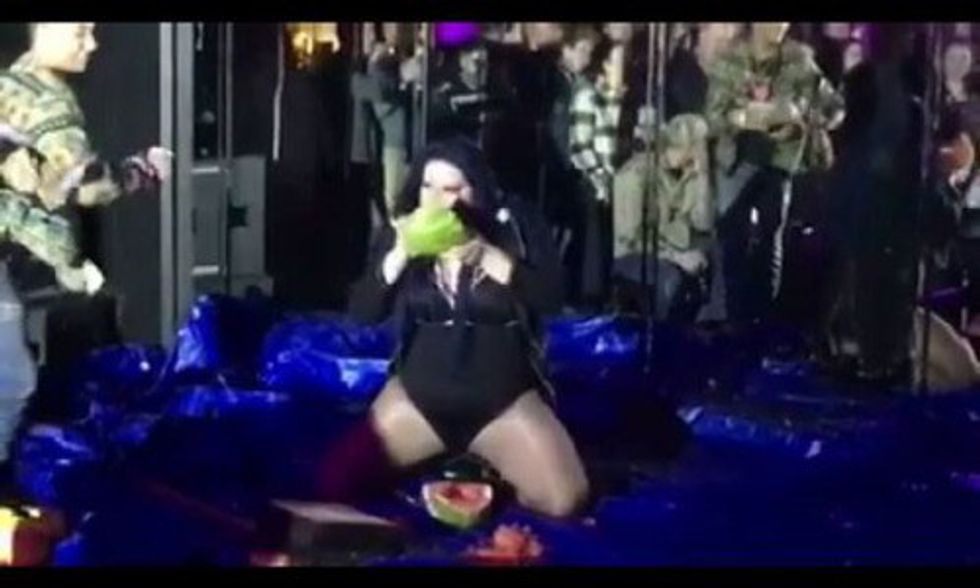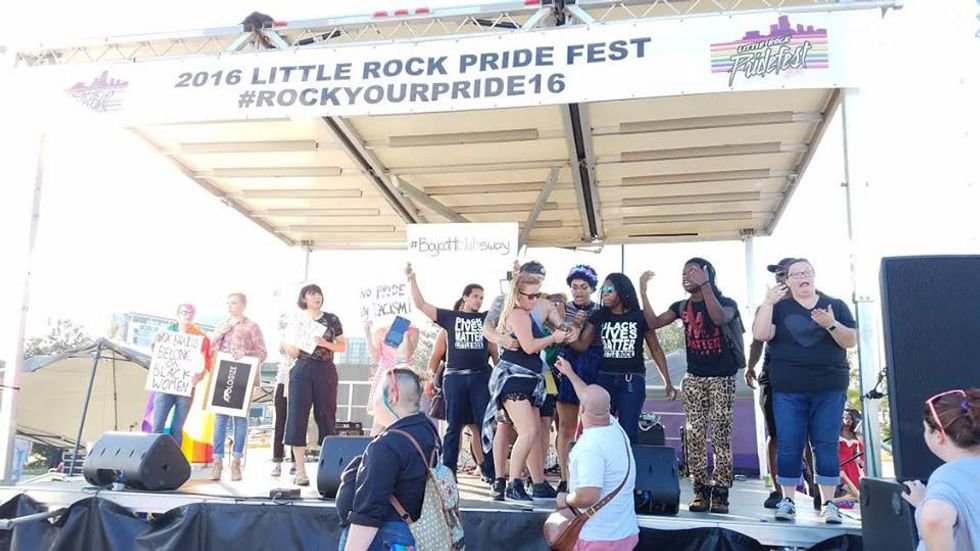On Sunday, Oct 16, downtown Little Rock saw this year’s Little Rock Pride Fest unfold with the usual banners and parade, food trucks and rainbow flags sold in tents, drag queens and kings, and $6 corn dogs, only this time with the addition of a new face: Little Rock’s own chapter of Black Lives Matter.
Run by Central Arkansas Pride, an LGBTQ advocacy and support organization, Little Rock Pride Fest proves itself to be not only the largest, but the most visible LGBTQ-related event in the central Arkansas area. Little Rock Pride Fest encourages the consolidation of numerous and diverse communities in what is intended to be a safe space on a single day to celebrate and empower themselves in the face of marginalization based on sexual orientation and/or gender identity. Some of these communities, however, experience something much different than what Pride appears to foster–and have taken to the streets, as well as the stage, to make a stand.
As usual, the Pride Fest features a parade with floats and walking groups from various organizations. Though local businesses and other allies enter the parade or set up tables as well, many of the organizations included in Pride Fest center on LGBTQ related issues, from gay-straight alliances such as the UALR Alliance to local activist groups to national organizations such as Planned Parenthood and Human Rights Campaign, and finally Little Rock’s only clubs that specifically cater to LGBTQ individuals: Triniti Nightclub and Club Sway. In fact, it is the sponsorship of Little Rock Pride Fest by Club Sway that also gives these local clubs significant weight in the event.
This, however, has only proven to be a small roadblock for the local activists who originally called for the removal of Club Sway from Little Rock Pride Fest. As a consequence of Central Arkansas Pride’s refusal to remove Sway, LGBTQ members of Black Lives Matter, as well as local social activist organization Center for Artistic Revolution, took to the streets–first marching in the parade and chanting “Racist drag is still racist” among other statements, then occupying the main stage and holding up signs reading “Apologize”, “Black Women Are Not Costumes”, No Pride in Racism”, and most notably: “#BoycottClubSway.”
Why boycott Club Sway? The driving forces behind this demonstration stretches back to nearly a year ago in which drag performer Anthony James Gerard, popularly known as Queen Anthony in the local LGBTQ community, put on a racially-charged performance at Club Sway in response to social media criticism from local LGBTQ youth of color. The initial criticism arrived due to Gerard posting a picture on Facebook on Sept 3 in which he is wearing a microbraid wig with the caption “I sometimes feel I was born in the wrong body” and the tag “#ebonyenchantress.” The first to point out the offensive connotations of a white man attempting to portray himself as a black woman was Savannah Rayne, a social activist who works with local organizations.
“The main reason why I called out Queen Anthony and Rhiannon Cortez (another drag queen from Club Sway who appropriated box braids) on social media was because I felt like the white and white-passing queer community has taken from black culture for so long, I mean everything from voguing to our language, that it was time for someone to finally say something,” Rayne says.
Though much of this controversy erupted as a direct result of Queen Anthony’s racially charged performance, the fact that cultural appropriation was what kicked off these tensions in the first place is a testament to how rising social consciousness has revived awareness of an oft-ignored social issue: the harm of culturally appropriating black hairstyles. Kylie Jenner’s appropriation of dreadlocks and more recently cornrows has spurred similar backlash on social media, some from notable celebrities like Amandla Stenberg.
Rayne explains cultural appropriation: “How would you feel if you wrote an entire paper, came up with the diorama, and made the powerpoint for a group project and then Becky, who has just been sitting back for the ride, came in and took full credit for the paper and made a higher grade than you?”
In response to backlash from Rayne and other LGBTQ activists of color, Gerard put on a performance at Club Sway in which he wore the same microbraid wig and performed to “Hate On Me” by Jill Scott, a black female artist, while smashing, eating, and rolling around in watermelon. Club Sway then posted a video of the performance with the caption “Queen Anthony with a message to the haters.”
“The song Anthony performed to was ‘Hate on Me’ by Jill Scott, a Neo-Soul artist that I have loved for years," says Trisha West, member of Black Lives Matter Little Rock and a protester at Little Rock Pride Fest. "The song has a lot of meaning to me because it's an empowerment song. I used to listen to it every morning to get my day started. Black women and femmes have to deal with so many micro and macroagressions every day. The lyrics speak about how no matter how much we give of ourselves it's never enough. And ironically, here we are.”
The video has gone viral since the controversy began, with many on social media remarking on the racially charged nature of the performance.
“Basically, a white, cisgender gay boy (Queen Anthony) decided it would be cute to wear box braids, eat watermelon, & refer to himself as an ebony enchantress during a performance--- blackface without the paint,” Rae Nelson, co-founder of Black Lives Matter Little Rock and one of the leaders of the protest at Little Rock Pride Fest posts on Facebook.
The actions that LGBTQ people of color have taken in response to this issue garnered a significant amount of criticism from Little Rock’s own LGBTQ community, in the form of social media backlash as well as physical and verbal hostility at Little Rock Pride Fest. A video of the demonstration that surfaced on social media shows audience members at Pride booing and yelling at the protesters, Little Rock Pride staff attempting to physically force them off the stage and drown them out with music, and finally a police officer pointing a taser at a few young protesters.
Rae Nelson reports receiving cuts from Little Rock Pride staff member Whitney Lee who attempted to pry the microphone out of Nelson's hands during the nonviolent demonstration. “The white woman cut my hand with her fingernails, the white man twisted my arm, and the white police officer pulled out a taser on us. And there was nothing that I could do about any of it because their whiteness is protected,” Nelson continues in her Facebook post.
“We had people boo us, curse at us, push and throw things at us, and ultimately had a taser drawn on us. All for daring to speak up against racism and challenging the status quo,” Trisha West says.
Two of the protesters who were targeted by a taser were present that day as members of Latinx Revolucion LGBTQ, an organization for Latin American members of the LGBTQ community run by Center for Artistic Revolution, standing in solidarity with Black Lives Matter.
Club Sway’s response to this issue appears to be largely dismissive. Following Queen Anthony’s racially offensive performance, members of Black Lives Matter and Center for Artistic Revolution attempted mediation with Anthony James Gerard and owners of Club Sway.
“We asked them to take FREE anti-racist trainings provided by local racial justice grassroot organizations, issue a public apology that would be drafted with the owners and folks from the meeting in question, and for them to implement rules within their club to prevent further racially insensitive actions like this from happening,” says Rayne, who was present at the mediation. Though Sway did release a statement in July that included an apology for the performance, owner Marcus Pinkney refused to meet the other requests. In addition, many of the demonstrators and advocates of the demonstration have cited that Sway’s apology was neither sincere nor took accountability for the incident, and even seems to defend Gerard’s actions.
“The performance art was not only a rebuttal to claims of racism, but also was meant to hold symbolism as a male who performs as a female shattering that paradigm as well. In retrospect, we understand that this performance can itself be construed as racist. Offense was not the intent,” the statement reads.
Club Sway’s refusal to meet any of the demands by Black Lives Matter resulted in activists from both Black Lives Matter as well as Center for Artistic Revolution resorting to direct action.
“It was my understanding that Club Sway's owners treated the situation as a nuisance to be dealt with rather than an opportunity to have meaningful discussions about the very real issue of racism in the LGBTQ community,” West continues.
The issue has garnered attention outside of just the Little Rock Community. RuPaul’s Drag Race winner and emcee of 2016 Little Rock Pride Fest, Bob the Drag Queen responded to the demonstration by publicly announcing his support for the Black Lives Matter movement. However, he tweeted on the day of Pride Fest: “Even if I don't agree with an artist's opinion, I still don't believe in censoring art,” presumably in response to the Club Sway controversy.
“I personally was very disappointed by Bob's response because it's that very way of thinking that gives people license to turn their heads and not address blatant issues that need to be tackled head on,” responds Trisha West. “As a black queer woman, I found Anthony's "art" to be very violent, racist, and misogynistic.”
As a result of this lack of resolution, Black Lives Matter Little Rock demands that Club Sway require approved anti-racism training for all of their performers, staff, management, and owners, issue a formal apology to Savannah Rayne who has received threats of violence for speaking against Gerard and Club Sway's support of his, issue a public apology that accepts accountability and acknowledges the racist intent of the performance, and return the money gained from appropriating black culture in the form of donations to local black organizations.




